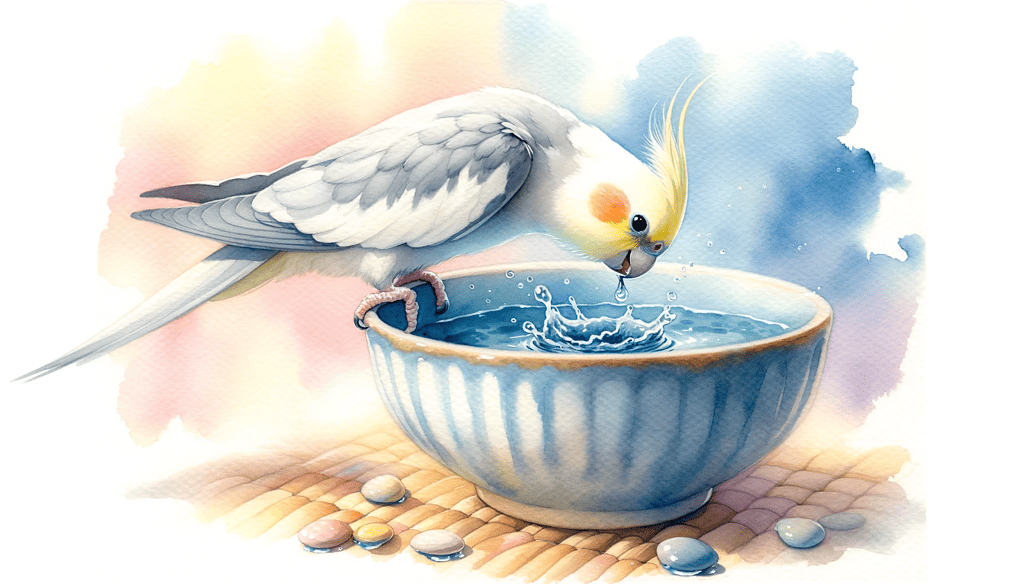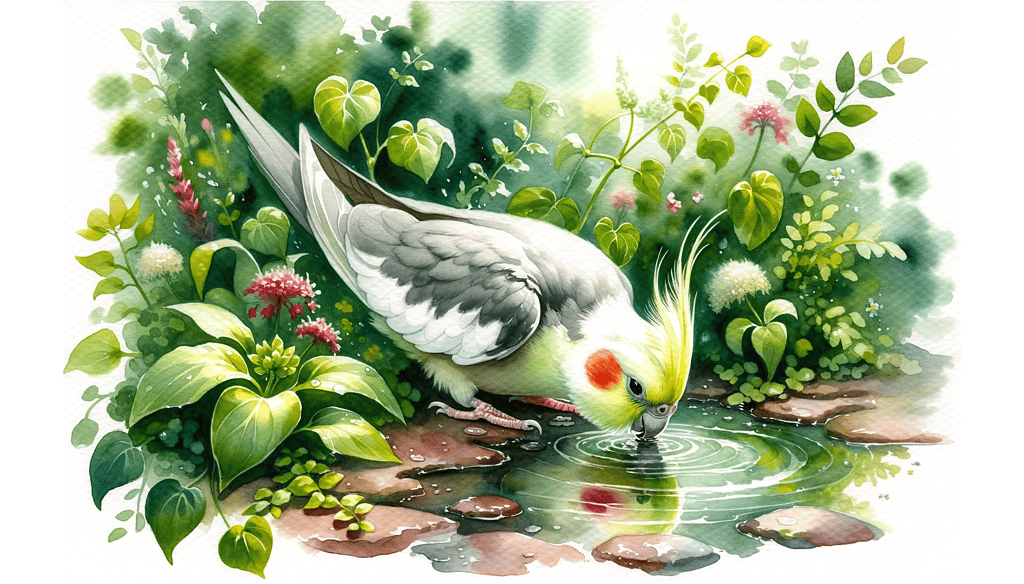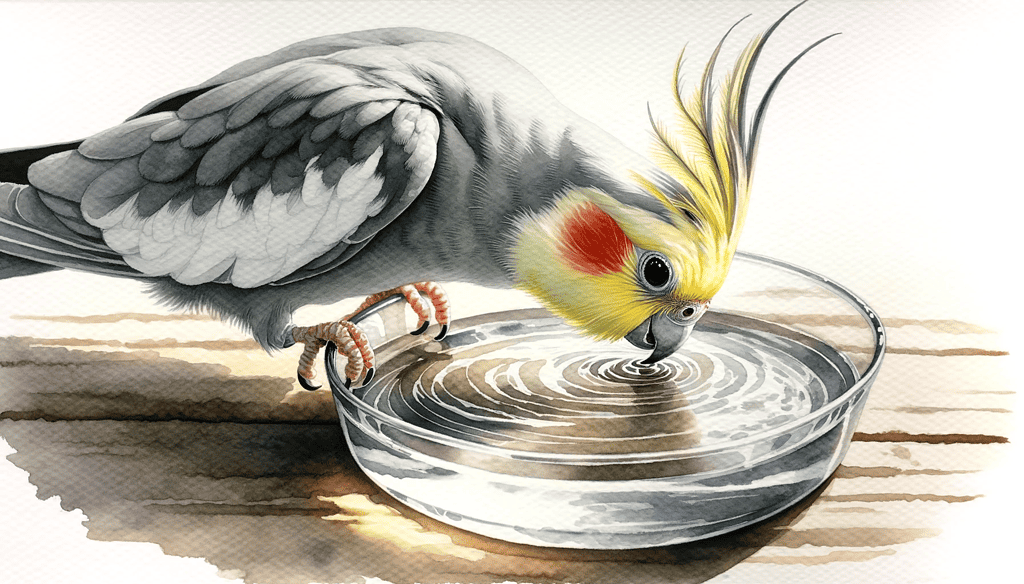
In the captivating world of cockatiels, every chirp and flutter is a testament to their vivacious spirit. The essence of water in their daily regimen isn’t merely a drop in the ocean; it’s an ocean in a drop, crucial for their vitality and vivacity. The query, ‘How Much Water Do Cockatiels Really Need?’ isn’t just a matter of routine care, but a step towards ensuring a well-hydrated, happy bird fluttering in your living space.
Cockatiels can consume about a teaspoon of water daily which can vary based on their diet. If they are fed water-rich foods, their water intake might be reduced to half a teaspoon per day. It’s essential to adjust the water supply based on the food provided to ensure they stay hydrated and healthy.
So, as you trail through the melody of chirps, let this guide be your compass in nurturing a well-hydrated cockatiel. Read on to unveil expert insights, and vet recommendations that will feather your nest with knowledge and your cockatiel with vibrant health.
How Many Times a Day Do Cockatiels Drink Water?
Cockatiels typically need to drink water 2-3 times a day, or about 5% of their body weight. It’s recommended to provide a fresh bowl of water to your cockatiel at least twice a day to keep them hydrated and happy, as they may appear not to drink water since they prefer to drink alone, but they still require constant access to water.
With their Australian roots, are accustomed to a dry, arid habitat. However, when they find a home with us, the dynamics of their water intake can change considerably based on a medley of factors.
Here’s a table to encapsulate the factors that nudge the water intake frequency of your cockatiel, along with a snippet of how each factor plays its part:
| Factor | Description |
| Air Humidity | Higher humidity can lessen the water intake as cockatiels absorb moisture from the atmosphere. |
| Room Temperature | The cooler the room, the lesser the water required to maintain body temperature. |
| Activity Level | A bustling day of play and flutter calls for more sips to stay hydrated. |
| Food Ingested | Wet foods like fruits contribute to water intake, possibly reducing the need for extra water. |
| Health Status | Health conditions might hike up the thirst levels. Consult a vet for personalized advice. |
How Much Water Do Cockatiels Need?

From the flutter of their wings to the chirpiness in their tunes, every little thing is interwoven with their water intake. Now let’s take a gentle flight down the avenues that outline how much water your feathery companion truly needs.
Age and Size
The water needs of cockatiels are as diverse as their captivating colors. From a tender age to their boisterous adulthood, the water requirements undergo a transformation. To encapsulate this evolution
Here’s a table to elucidating the water needs of juvenile and adult cockatiels.
| Stage | Daily Water Intake (ml) | Notes |
| Juvenile | 15-30 | Their growing bodies and active lifestyle necessitate a higher water intake. |
| Adult | 10-25 | Their settled lifestyle and regulated diet may not require as much water as juveniles. |
Health and Activity Level
I’ve seen a bird’s zest for life mirrored in their water consumption. A hearty chirp, a playful flight around the room, all these activities stir up a thirst that needs quenching. Conversely, a cockatiel under the weather might show an uptick in water consumption as a natural response to fight off the ailment.
Diet
A cockatiel’s diet is like the rhythm to their melody, it orchestrates their overall well-being, water intake included. Here are some dietary considerations and how they impact your cockatiel’s water needs:
- Dry Food: Seeds, the traditional dry fare, will surely send your cockatiel to the water dish more often.
- Fresh Fruits and Vegetables: These watery treats contribute to their daily water intake, possibly reducing the need for additional water.
- Pelleted Diets: Engineered for balanced nutrition, they might also mediate the water needs to some extent.
- Protein Sources: Offerings like boiled eggs or legumes might spur a thirst for more water to balance the protein intake.
- Treats and Supplements: Occasionally served, these might temporarily hike up the water intake.
How Do You Know if Your Cockatiel Is Dehydrated?
Spotting the signs of dehydration early on is crucial. The physical and behavioral cues are the silent verses your cockatiel sings when in need of hydration.
Physical Signs
The physical signs of dehydration can range from subtle to glaring.
- Dry, flaky skin, a dull or ruffled appearance to their otherwise gleaming feathers, and sunken eyes are your cockatiel’s way of nudging you about its thirst.
- The elasticity of their skin can also indicate their hydration level; gently pinch the skin at the back of their neck, and if it doesn’t return to its original position quickly, it’s time to pay heed.
Behavioral Changes
Behavior is a window to your cockatiel’s wellbeing.
- A dehydrated cockatiel might become lethargic, lose its usual playful demeanor, or even become irritable.
- Their chirps might lose their melody, morphing into anxious tunes.
- They might also spend more time near their water dish, an obvious sign they’re yearning for more water.
How Long Can Cockatiels Go Without Drinking Water?
As for how long cockatiels can go without water, there is some variability in the information available.
- A healthy adult cockatiel can potentially survive for up to three days without water, though the actual duration may vary depending on factors such as the bird’s health, age, and environment.
- Some bird owners have reported that a cockatiel can live without any food and water for almost two and a half days or up to 50 to 60 hours, but many bird experts believe that in most cases, a cockatiel can survive less than 19 to 23 hours without water.
- However, many experts believe cockatiels and most birds can live for approximately about a day without water.
- Some suggests that cockatiels can go without water for about two days, but they will become dehydrated and will need water as soon as possible to avoid serious health problems.
What Water Is Safe For Cockatiels To Drink?

The quality of water you provide plays a pivotal role in maintaining the health and vigor of your cockatiel. Here’s a table comparing different water purification methods to help you choose the best for your feathery companion:
| Method | Pros | Cons |
| Boiling | Kills bacteria and viruses. | Does not remove chemicals or heavy metals. |
| Filtration | Removes impurities and some chemicals. | May not kill all bacteria or viruses. |
| Distillation | Removes bacteria, viruses, and most chemicals. | Time-consuming and energy-intensive. |
| Chlorination | Kills bacteria and viruses. | May leave harmful residues and alter taste. |
| Bottled Spring Water | Convenient and usually safe. | Plastic bottles are environmentally unfriendly. |
Each sip your cockatiel takes should be a step towards health, not away from it. Assess the water quality, choose a purification method that suits, and let each droplet of water be a promise of health, happiness, and harmonious chirps for your beloved cockatiel.
Best Practices For Providing Water to Cockatiels
Water, the elixir of life, is as fundamental to our feathered companions as it is to us. The way we provide this essential element can markedly influence our cockatiels’ health and happiness.
Types of Water Containers and Their Pros and Cons
The market is awash with different types of water containers, each with its own set of advantages and disadvantages. From traditional bowls to water bottles and automatic dispensers, the choices are aplenty.
- Bowls are easy to clean and allow birds to drink naturally, they can also be a playground for bacteria if not cleaned regularly.
- Water bottles and automatic dispensers, on the other hand, keep the water clean but might take some time for your cockatiel to get accustomed to.
It’s about finding a middle ground that suits both you and your feathery companion.
Importance of Fresh Water and How Often to Change It
Freshness in water is as inviting to birds as it is to us. Stale water is a breeding ground for pathogens and can be a silent perpetrator of diseases. I always recommend changing the water at least once a day, or more in hot weather or if the water looks dirty. Consistency in providing fresh water is a straightforward yet impactful way to promote good health.
Tips to Encourage Your Cockatiel to Drink More Water
Getting your cockatiel to drink ample water can sometimes be a challenge, but with a little creativity and observation, you can ensure they stay hydrated. Here are some tips:
- Location, Location, Location: Place the water container in a spot where your cockatiel usually hangs out. Familiarity breeds comfort!
- See-through Containers: Cockatiels are more likely to drink from containers where they can see the water level.
- Add Some Greens: Submerging fresh greens in water can entice them to drink more while pecking at the greens.
- Mimic Drinking: Sometimes, seeing you drink water can pique their interest to take a sip too.
- Keep It Clean: A clean water container is more inviting, ensuring it’s free from old food, feathers, or droppings.
What I Recommend to Cockatiel Owners
When faced with dehydration, acting promptly can make a world of difference. Here are some steps and recommendations:
- Observation: Keep a keen eye on your bird’s behavior and physical condition.
- Immediate Rehydration: Offer fresh water, and if the bird isn’t drinking, use a dropper to gently give water.
- Create a Comfortable Environment: Adjust the temperature and humidity to ensure it’s comfortable for your cockatiel.
- Consult a Vet: At the first sign of severe dehydration, consulting a vet is imperative.
- Follow-Up Care: Adhere to the vet’s instructions for rehydration and monitor your bird closely.
- Quality Over Quantity: Always ensure that the water you provide is fresh and free from contaminants. It’s a simple act that holds profound benefits.
Conclusion
Your expedition into the world of cockatiel care, especially concerning water provision, is a blend of vigilance, education, and abundant love. By adhering to the guidelines shared, not only will you foster a nourishing habitat for your feathered companion, but you’ll also weave a bond that resonates with trust and understanding.
Your reflections on this journey are invaluable. Do share your thoughts in the comments, and if this guide has illuminated your path, feel free to share the article with fellow bird enthusiasts.
Frequently Asked Questions
How can I tell if my cockatiel is dehydrated?
Look for signs such as sunken eyes, dry or sticky beak, and lethargy. When in doubt, a vet check is the best route.
Can cockatiels drink tap water?
While many cockatiels do fine with tap water, it’s always safer to provide filtered or purified water to avoid potential contaminants.
What other liquids can cockatiels consume?
Apart from water, cockatiels can enjoy fresh vegetable juices in moderation. However, it’s best to consult with your vet for personalized advice.
How can I ensure my cockatiel is getting enough water?
Regular observation, providing fresh water, and making water easily accessible are key steps. Additionally, a balanced diet that includes fresh fruits and vegetables can also contribute to their hydration.
